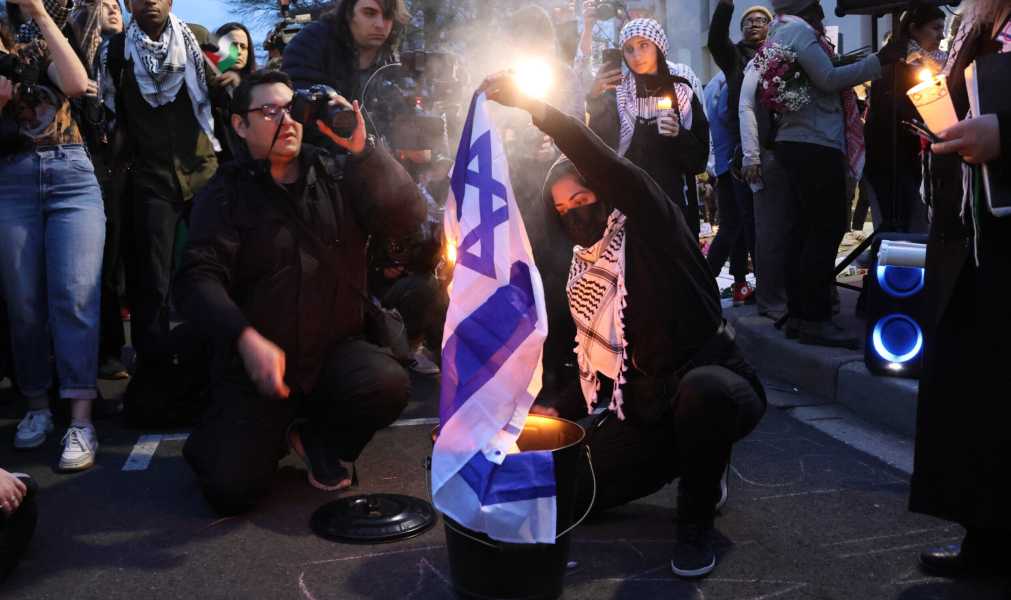Americans are underrating the cynicism that has taken hold of the country—if the reaction to a deranged activist’s suicide is any indication.

The disturbing images of the U.S. airman Aaron Bushnell lighting himself on fire Sunday outside the Israeli embassy in Washington, D.C. spread across social media in the hours after his untimely death.
So too did attempts to transform Bushnell’s tragic act into something heroic. Time magazine compared him to the early Christian martyrs persecuted by the Romans, citing the “long and controversial history of self-immolation as political protest.”
The academic and third-party presidential Cornel West praised “the extraordinary courage and commitment of brother Aaron Bushnell,” whom he described as having “died for truth and justice.”
“There is no evidence Aaron Bushnell was suffering from mental illness,” tweeted Daily Beast columnist Wajahat Ali. “He was very clear about his reasoning for self immolation, the most extreme form of protest against what he believes is an ongoing genocide against Palestinians by Israel.”
When Slate senior writer Mark Joseph Stern expressed concern about valorizing suicide when committed for stated political ends, a social media user who described himself as a mental health counsellor concluded an angry response with “F— you, dude.”
I make no confident claims about Bushnell’s mental health, though I would wonder about what would drive a person in his particular set of circumstances to pick this specific form of protest. I lack the necessary expertise to diagnose him. I never met him, much less examined him. But I have no doubt that his viral demise and the subsequent celebration of his final acts will be seen and remembered by people who are mentally unwell or struggling with suicidal tendencies.
What I would say with confidence is that the discourse surrounding his death says many things about our society, none of them positive. Bushnell’s views on Israel’s war on Hamas are not my own, but I wouldn’t reach a different conclusion if he was a pro-life activist who set himself ablaze outside an abortion clinic and whose last words were “Protect the unborn.” No one is alive today because that young man is dead.
Instead, it is evident we don’t attach sufficient value to human life, even when the loss of human life is the matter under debate. That this would be an act of first resort justified by comfortable and privileged people, some cloaked in anonymity but many others quite prominent, is a sad commentary. Yet it is not surprising in a climate where celebrities downplay Hamas’s atrocities or politicians imply that there are no innocent civilians in Gaza.
We live in an age of war, terrorism, torture, abortion, euthanasia—and sophisticated apologetics for all of the above from the commanding heights.
In this case, we see a perversion of the nobility of sacrifice. Some evils must be resisted, even unto death. “Greater love has no one than this: to lay down one’s life for one’s friends,” reads John 15:13.
Subscribe Today Get daily emails in your inbox Email Address:
The late Rep. Walter Jones Jr. of North Carolina included this verse in the letters he wrote to soldiers killed in the Iraq war, even as he turned against the conflict. Jones wrote the letters to the fallen as part of his repentance for having voted to send them to die. “He’s told me of the anguish he felt about the deaths in Iraq,” Jones’s priest told Mother Jones in 2006. “He would talk to me after Mass to say that his heart was so disturbed.” (Jones later told me had agreed to cooperate with this profile because his young press secretary erroneously believed that Mother Jones was a Catholic magazine.)
Finally, we are seeing all the ancient hatreds in the world from which America was meant to be a refuge find a home in the hearts of our countrymen. All this is amplified by an online culture that can transform disagreements about pop singers and culinary trends into all-consuming vendettas.
Some of those most loudly cheering this trending suicide of the month would like to see a figurative self-immolation of the West. It is in times such as these where it is no exaggeration to talk about, and lament, the culture of death.
Sourse: theamericanconservative.com